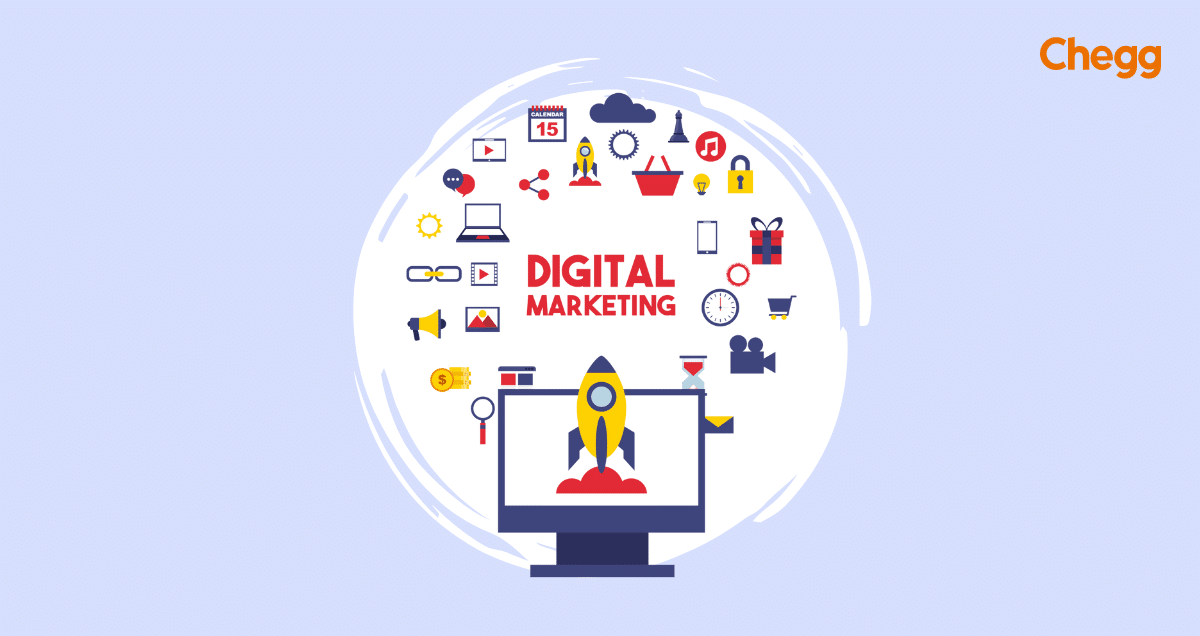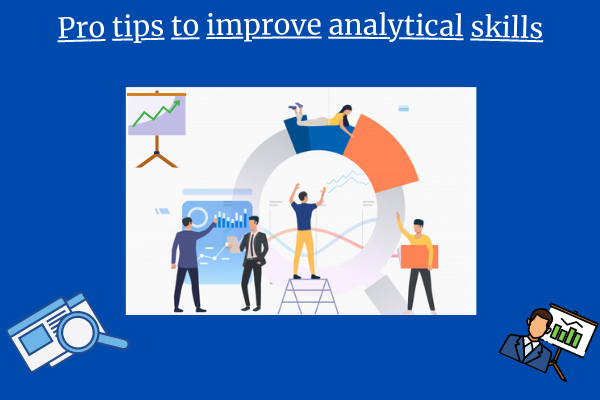A Detailed Guide to the Scope of Digital Marketing in India
Whether opening a small coffee shop or any other type of business, embracing digital marketing is staying relevant and thriving in today’s digital-driven world. It’s time to grab that virtual megaphone connecting with customers on a new level. The digital revolution has changed how businesses operate and sell their products and services. The scope of […] The post A Detailed Guide to the Scope of Digital Marketing in India appeared first on Chegg India.

Whether opening a small coffee shop or any other type of business, embracing digital marketing is staying relevant and thriving in today’s digital-driven world. It’s time to grab that virtual megaphone connecting with customers on a new level. The digital revolution has changed how businesses operate and sell their products and services.
The scope of digital marketing is set to rise dramatically in 2023 in India, a country with a fast-increasing digital environment. This article digs into the numerous elements fueling the expansion of digital marketing in India and the enormous opportunity it provides for organizations.
Scope of Digital Marketing in India
The future scope of digital marketing in India is brimming with possibilities. With the help of embracing the following trends and harnessing emerging technologies, businesses can stay ahead of the competition, connect with their target audience, and drive meaningful results in the dynamic Indian market. As well as for individuals, it opens up a lot of digital marketing jobs for freshers or just- graduate students.
The future of digital marketing in India is undoubtedly exciting, offering endless opportunities for businesses to innovate and thrive in the digital era.
1 Rising Importance of Data-Driven Marketing
Data-driven marketing has always contributed to the future scope of digital marketing in India. With its help, businesses collect vast amounts of customer data; they can gain valuable insights into consumer behavior, preferences, and purchasing patterns.
These insights enable businesses to create personalized and targeted marketing campaigns that resonate with their audience.
2 Shift Towards Mobile and Voice Search
With the increasing use of smartphones and voice assistants, the future of digital marketing will see a significant shift towards mobile and voice search.
As more users rely on mobile devices for internet access, businesses must ensure their websites are mobile-friendly and optimized for mobile search.
3 Artificial Intelligence and Machine Learning
AI-powered technologies can analyze large data sets, automate repetitive tasks, and provide personalized customer experiences.
Chatbots, for example, can enhance customer support and engagement, providing instant responses and personalized recommendations. AI and ML algorithms can also optimize ad targeting, content creation, and campaign management.
4 Video Marketing Dominance
Video marketing will continue to dominate the digital landscape in India. With the increasing availability of high-speed internet and the popularity of platforms like YouTube and TikTok, video consumption has skyrocketed.
Businesses can leverage video marketing to tell compelling stories, engage with their audience, and drive brand awareness.
5 Influencer Marketing Evolution
Influencer marketing will evolve to meet the changing demands of consumers. As consumers become more discerning, businesses must focus on building authentic relationships with influencers.
Micro-influencers, who have smaller but highly engaged audiences, will gain prominence. The future of influencer marketing will emphasize transparency, authenticity, and long-term partnerships.
6 Augmented Reality (AR) and Virtual Reality (VR)
AR and AR can enhance customer experiences by overlaying digital elements in the real world, enabling users to visualize products, try virtual experiences, and make informed purchasing decisions.
In contrast, virtual reality (VR) provides immersive experiences that transport users to virtual locations, offering new avenues for storytelling and participation.
7 Automation and Personalization
Automation and personalization will become even more crucial in the future of digital marketing. Dynamic content and personalized recommendations will enable businesses to provide tailored experiences for individual users, driving customer engagement and loyalty.

Job Opportunities in Digital Marketing
Digital marketing has become an important component of business strategies across industries, leading to a surge in job opportunities in this field. As India embraces the digital revolution, the demand for skilled digital marketing professionals continues to grow. To understand how to start digital marketing, it is essential to know about some of the key roles, job responsibilities and the skills required.Here are some of the most sought after job profiles to build a career in digital marketing :
1 Digital Marketing Manager
A digital marketing manager oversees the development and execution of digital marketing campaigns. They are responsible for setting goals, managing budgets, and ensuring the overall success of marketing initiatives. Many online marketing jobs such as these are easily available on job-finding sites.
In this role, individuals need a strong understanding of digital marketing strategies, analytics, and the ability to manage cross-functional teams.
Skills Required:
- In-depth knowledge of various digital marketing channels such as SEO, SEM, social media, email, and content marketing.
- Excellent communication skills to collaborate with stakeholders and manage client relationships.
- Informed about the latest industry trends and best practices.
2 Search Engine Optimization (SEO) Specialist
An SEO specialist focuses on improving a website’s visibility and organic search rankings. They optimize website content, research keywords, analyze data, and implement on-page and off-page optimization techniques.
An SEO specialist must possess technical SEO knowledge, analytical skills, and a keen eye for detail.
Skills Required:
- Experience with website auditing, on-page optimization, and link-building strategies.
- Analytical skills to monitor website performance and identify areas for improvement.
- Knowledge of HTML, CSS, and website analytics platforms.
3 Social Media Manager
Social media managers are responsible for planning, implementing, and managing social media strategies across various platforms. They create engaging content, interact with followers, monitor brand mentions, and analyze campaign performance.
Individuals must be well-versed in social media platforms, content production, and community management.
Skills Required:
- Strong copywriting and content creation skills.
- Knowledge of social media analytics to measure the effectiveness of campaigns.
- Ability to identify and engage with target audiences effectively.
4 Content Marketing Specialist
Content marketing specialists develop content strategies, write blog posts, create videos, and manage content distribution channels. Strong storytelling, writing, and strategic thinking skills are essential for this role.
Skills Required:
- Exceptional writing and editing skills.
- Understanding of content marketing strategies and audience targeting.
- Proficiency in content management systems and marketing automation tools.
- Familiarity with data analysis to measure content performance.
5 PPC/SEM Specialist
PPC (Pay-Per-Click)/ SEM (Search Engine Marketing) specialists manage paid advertising campaigns on platforms like Google Ads or Bing Ads. They create and optimize ad campaigns, research keywords, and monitor ad performance to achieve the desired results. Analytical skills, attention to detail, and knowledge of online advertising platforms are critical for this role.
Skills Required:
- Expertise in Google Ads, Bing Ads, or other PPC platforms.
- Proficiency in keyword research and ad copywriting.
- Knowledge of bid management and campaign optimization techniques.
- Stay updated with the latest PPC trends and industry developments.
Current State of Digital Marketing in India
The rise of digital marketing in India has been ascribed to several factors that have aided in its expansion and popularity.
The following factors have enabled businesses to reach a wider audience, engage with customers in a more targeted and personalized manner, and drive measurable results. The rise of digital marketing continues to transform how businesses communicate with their customers and survive in the digital age as India embraces the digital revolution.
1 Rising Internet Penetration
India is experiencing an exploding surge in internet usage. According to the Internet and Mobile Association of India (IAMAI), the country had over 700 million users by the end of 2020.
This number is projected to grow rapidly, driven by affordable smartphones, widespread connectivity, and initiatives such as Digital India. With more people coming online, businesses have a vast audience to target through digital marketing strategies.
2 Mobile-First Nation
India has embraced the mobile revolution wholeheartedly and is now a mobile-first nation. The accessibility and affordability of smartphones have transformed the way Indians consume information and interact with brands.
The mobile-first approach allows businesses to connect with consumers anytime, anywhere, providing personalized experiences and driving customer loyalty.
3 Social Media Boom
Social media platforms have become essential to millions of Indians’ lives. In 2020, India had the highest number of Facebook users globally, with over 300 million active users. In addition, sites such as Instagram, Twitter, and LinkedIn have seen a tremendous rise in user numbers.
Social media is an essential component of any digital marketing plan in India because of its capacity to harness user-generated content, influencer marketing, and targeted adverts.
4 E-commerce Growth
The Indian e-commerce market has expanded dramatically due to increased internet usage, easier payment alternatives, and many others.
For e-commerce enterprises, digital marketing is critical for increasing brand awareness, growing website traffic, and enhancing conversions.
5 Regional Language Content
India has hundreds of languages spoken across its states, making it a linguistically diverse country.
With such a vast number of regional languages, creating content in these languages opens up new avenues for marketers to engage with untapped markets, reach out to a large audience and gain a competitive advantage.
6 Data Analytics and Personalization
With the increasing availability of data and technological advancements, marketers in India can leverage analytics tools to gain insights into customer preferences, optimize campaigns, and deliver personalized experiences.
Data-driven marketing strategies enable businesses to make informed decisions, increase customer engagement, and drive conversions.
7 Influencer Marketing
Influencer marketing has gained immense popularity in India and is expected to continue its upward trajectory in 2023. Influencers, particularly in the beauty, fashion, and lifestyle niches, substantially impact consumer purchasing decisions.
Collaborating with influencers allows brands to tap into their engaged and loyal audiences, amplifying brand reach and credibility.
8 Government Initiatives and Digital Policies
The Indian government has been proactive in driving the growth of digital infrastructure and initiatives. Digital India, Make in India, and Skill India aims to turn the country into a digitally enabled society and knowledge economy.
These initiatives provide a favorable environment for businesses to leverage digital marketing strategies.
Time to Harness the Power of Digital Marketing
By harnessing the power of digital marketing, businesses in India can effectively navigate the evolving landscape and unlock new opportunities for growth and success in 2023 and beyond. With the right approach and a deep understanding of the Indian market, businesses can capitalize on the expansive scope of digital marketing to build brand equity, drive sales, and create lasting customer relationships.
Evaluate numerous career choices to choose the right career path for yourself. Dive in to our guide on Career Advice.
Frequently Asked Questions ( FAQs )
The scope for digital marketing is vast, with increasing internet penetration and businesses’ growing reliance on online channels. It offers opportunities in various roles, such as digital marketing manager, SEO specialist, social media manager, and content marketing specialist. The scope includes various industries and businesses of all sizes, making it a promising field for career growth.
Digital marketing is a promising career in India. With the rapid growth of the digital ecosystem and the need for businesses to establish a solid online presence, skilled digital marketers are in high demand. The industry offers diverse job roles, competitive salaries, and ample professional growth and development opportunities.
Like any job, the stress level in digital marketing can vary depending on factors such as workload, deadlines, and the specific role one holds. Digital marketing involves continuous learning, staying updated with industry trends, and managing multiple campaigns simultaneously. While it can be demanding, effective planning, time management, and a passion for the field can help manage and minimize stress.
The ease of a digital marketing job depends on individual skills, experience, and adaptability. While some aspects may be relatively straightforward, such as executing certain campaigns or implementing strategies, digital marketing also requires continuous learning, adapting to evolving trends, and analyzing data to optimize results. It requires combining technical knowledge, creativity, and analytical skills, making it a dynamic and intellectually stimulating field.
The post A Detailed Guide to the Scope of Digital Marketing in India appeared first on Chegg India.


















/cdn.vox-cdn.com/uploads/chorus_asset/file/25115065/DCD_Avishai_Abrahami.jpg)







